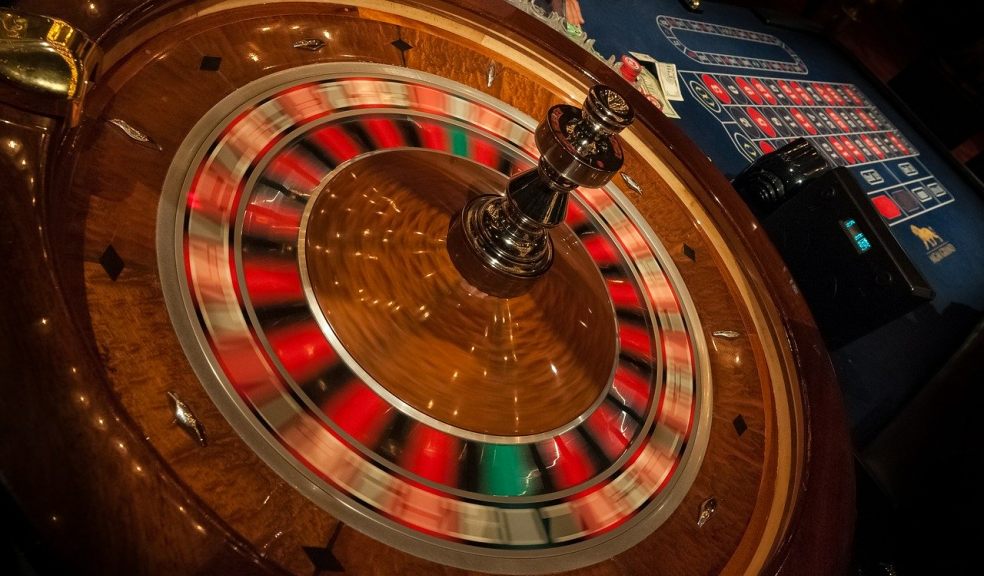Artist rendering of what Two Kings Casino may look like when construction is done! Courtesy Two Kings Casino, Kings Mountain, North Carolina
We begin with a brief review of the Catawba Tribe’s recognition history: In 1941, the Catawba Indian Tribe of South Carolina was federally recognized as a tribe. In 1959, the Catawba lost federal recognition as a tribe due to the Termination Act, a federal policy through which American Indian tribes would be disbanded and their land sold. The Catawba reorganized their Tribal Council and gained recognition from South Carolina. They began petitioning to regain federal recognition in 1973, which ended with the Catawba Indian Tribe of South Carolina Land Claims Settlement Act of 1993 which repealed the1959 Termination Act. Under this settlement, the tribe gained recognition, along with $50 million for economic development, land acquisition, education, social services and elderly assistance. Under this 1993 settlement, the tribe’s “service area” included area in South Carolina and the North Carolina counties of Cabarrus, Cleveland, Gaston, Mecklenburg, Rutherford and Union.

Native American Indian Tribes of South Carolina. Map courtesy of USslave.blogspot.com.
In return for recognition, the Catawba relinquished claims to land the tribe said was stolen by the state of South Carolina and agreed to be excluded from the Indian Gaming Regulatory Act, which authorizes and describes how tribes can have tribe-owned gambling. To gain federal recognition, the Catawba agreed to be bound by the more restrictive Settlement Act, and the laws of South Carolina which put the tribe in a uniquely disadvantaged position relative to income from gaming. Of the nearly 600 tribes recognized by the federal government, the Catawba are the only one headquartered in South Carolina.
Some but not all Native American communities build a measure of economic prosperity from casino activities. Some also experience co-occurring social and health problems related to their casinos.
The Catawba Native American Tribe reservation is located near Rock Hill, in northern South Carolina, a state which does not allow casinos. The tribe, a low-income community, has pushed for years to develop profitable gaming. After being defeated in South Carolina courts in 2008, they announced plans to build a casino in North Carolina, where they have federally recognized tribal rights in the six counties mentioned above.

Catawba Corporations logo courtesy of Catawba Corporations website.
The South Carolina based Catawba Tribe has developed several other corporations for revenue in five areas: Facilities and Maintenance, Professional Services, Engineering Services, Information Management, and Security Services with a focus on the environment.

Deck of cards with dealer behind table. Gaming photo courtesy of Psychguides.com.
The core of the Catawba’s push for a NC casino is twofold. First are the different classes of gaming allowed under the Indian Gaming Regulatory Act. Class I is limited to social games exclusively for prizes of minimal value or traditional forms of Indian gaming as part of, or in connection with, tribal ceremonies or celebrations. Class II allows live and electronic bingo games plus what is permitted in Class I. Class III is basically all other gambling, including high stakes games like poker, blackjack, baccarat, video machines simulating those games, and slot machines, what is usually thought of as a casino and associated gaming activities.

Bingo photo courtesy of Georgia Recorder.
The Catawba tried several times to turn a profit with Class II bingo outlets allowed under South Carolina law without success. The tribe sued SC for the right to operate video poker machines, but the U.S. Supreme Court declined the case.
NC is more relaxed with their Class III gaming and by seeking a NC presence near Kings Mountain, the Catawba could build on the success of the Eastern Band of Cherokee’s already established in two different NC locations. The Catawba selected Kings Mountain because it is very near the Catawba’s home base in Rock Hill, SC. The Eastern Band of Cherokee’s chief did not, and does not, welcome Catawba competition and publicly criticized some of the relationships and actions the Catawba took to move towards their goal of a NC casino.
To eliminate the gambling restrictions in the1993 Agreement hurdle they have taken several steps.

Wallace Cheves. Photo courtesy of Skyboat Gaming website.
They partnered with Wallace Cheves, a developer of diverse interests, a major one of which is gambling and casinos. His career history is checkered. It includes criminal and civil enforcement actions against him involving illegal gambling, money laundering and the operation of illegal sweepstakes gaming in SC.
Cheves is a long-time, major Republican contributor with significant political connections. He gave nearly $500,000 to President Donald Trump, and Senators Lindsey Graham (R-SC), Thom Tillis (R-NC), Richard Burr (R-NC) and others. In addition, he gave almost $35,000 to South Carolina Congressman William Timmons (R-SC4), his Team, and more money to various SC GOP-related political action committees according to the Federal Election Commission website.

Senator Lindsay Graham (R. SC) and Senator Thom Tillis (R. NC). Photos courtesy of Variety.
“Cheves founded Sky Boat Gaming in 2009 to develop gaming opportunities for the Catawba Indian Nation,” according to his bio on the Sky Boat website which also states Sky Boat worked with the Catawba on their application to the Department of the Interior for this project. It adds, Cheves assisted the Catawba’s selection of Delaware North as their casino operator.
In April 2016, Cheves’ company Sky Boat hired Ballard Partners, the lobbying firm founded by longtime Trump associate Brian Ballard, whose closeness to the president made him a powerful lobbyist in D.C.

Roulette photo courtesy of ExeterDaily.com.
Records obtained by ProPublica show between March and July of 2017, Senator Graham had four phone calls and two in-person meetings with Mick Mulvaney, former SC congressman, then director of the Office of Management and Budget. One call came a day prior to Mulvaney meeting with Cheves and an unnamed Catawba lobbyist. Cheves maxed out contributions to Graham’s campaign three months later. The July meeting drew speculation from the Daily Beast that it concerned the casino. In the spring of 2018 the Department of the Interior challenged the Catawba’s application, forcing them to withdraw.
In the summer of 2018, government records show, Graham called then-Interior Secretary Ryan Zinke, and in September the Catawba filed again. The tribe’s lobbying firm contributed $1,500 to Graham’s campaign the next month, according to federal filings; two years ahead of the election.
By March 2019, Graham personally agreed with Cheves’ point of view, and introduced S.790 – Catawba Indian Nation Lands Act to grant the Catawba rights to the casino. Graham’s press release announcing the bill made clear this move was specifically intended to overrule the rejection the Department of the Interior handed down the previous year as stated in his quotes below.
The Catawba Nation has been treated unfairly by the federal government, and our legislation rights that wrong,… I hope this legislation will be quickly passed through the Congress and signed into law so we can once and for all bring resolution to this issue. … Four years ago, the Catawba submitted an application to the Bureau of Indian Affairs seeking the ability to operate a casino. No action has been taken on the application…
During the Subcommittee for Indigenous Peoples of the United States’ congressional hearing of H.R. 8255, the Catawba Indian Nation Lands Act, which would reaffirm the U.S. Department of the Interior’s March, 2020 decision to place land into a trust for the Catawba to develop a casino, both Rep. Mark Walker and Richard Sneed, Principal Chief of the Eastern Band of Cherokee Indians, criticized Cheves’ involvement during the hearing.

Senator Richard Burr (R, NC). Photo courtesy Encyclopedia Britannica.
Senators Graham, Tillis and Burr in November, 2020 co-sponsored and secured the introduction of S.790 – Catawba Indian Nation Lands Act to authorize the casino and allow the tribe to operate it under the Indian Gaming Regulatory Act, ending the restrictive parts of the 1993 settlement. This action by the Senators came shortly after receiving donations from Cheves which brought speculation with some parties of a quid pro quo.
At first the bill stalled. Then, the bill’s second iteration passed hidden away within the FY2022 National Defense Authorization Act, on page 905 of the 910-page document. The Appropriations and the National Defense Authorization legislation is where a vast, eclectic cornucopia of bills are hidden and passed.
There are still some steps yet to be taken for the Catawba. In the NC General Assembly, House Speaker and attorney Tim Moore (R-Cleveland), recused himself when the gaming and casino project came for discussion there because he had represented some involved. There is also continued opposition from the Eastern Cherokee and not everyone in either South or North Carolina welcomes casinos and high stakes gambling in their states.

The negative impact gambling can have if you lose. Photo of gamer courtesy of casino.org.
In the U.S., casinos are often located in high crime areas or rural, remote areas which makes them an attractive target for thieves and felons. They attract people carrying large sums of money for gaming, food, alcohol intake and casino related entertainment. Some attract human trafficking and illegal drugs. This is not always the case. It depends on the operators, location and how serious the owners, operators are about the safety and wellness of their patrons.
There may be a few surprises for patrons who don’t check out the rules before going to Native American gaming properties. There is a W-2G tax form winners receive as they conclude playing. The security guards often have more authority, usually the full force of law, due to other jurisdictions not applying on Native American land, in most instances. While casinos often bring additional business to the entire area, since the pandemic, this has not been predictable; and the hours of operation along with unmet expectations often increases anxiety, depression, drug use and suicide.
Another reluctance to casinos is they may bring into one locale several addictive disorders, compulsive gambling, substance use disorder and sexual addictions. Each of which are destructive and unfortunately for some, one can lead to another.
Gambling has been banned in South Carolina since 1802 aside from the lottery. Outside of black market betting, residents and visitors they are out of luck if they want to gamble. The state didn’t allow charitable groups to hold raffles until 2015.
So, why is SC Senator Lindsay Graham, SC Congressman William Timmons and others working hard to help establish gambling and casinos for the Catawba in N.C. and taking campaign contributions from gambling casino lobbyists to do so? There will be more to come concerning gambling, casinos and SC politicians.
Barbara Bush, M.P.S. was an alcoholic/drug addict until age 34, and after a 5 year cleansing period she earned a master’s degree from Loyola University Graduate Institute for Ministry. Her career has spanned federal, state and local governments, community organizations and ministry working in behavioral health, criminal justice and human services. For the past ten years she has focused on promoting Biblical Truth. She is the principal at Graceful Dynamics Consulting.
Please “like”, comment, share with a friend, and donate to support The Standard on this page.



 RSS - Posts
RSS - Posts